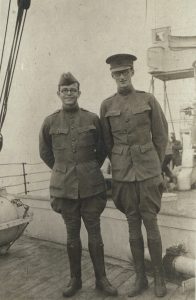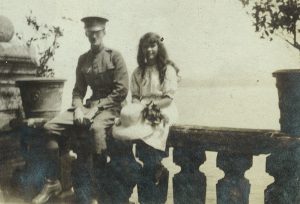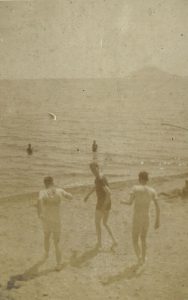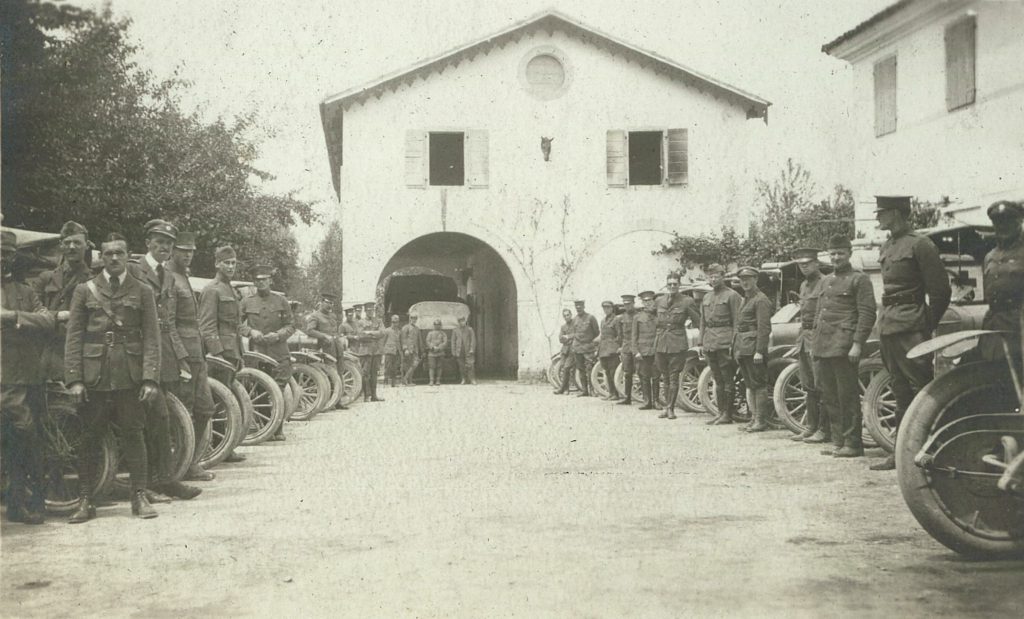
My paternal grandfather kept scrapbooks all his adult life, beginning with volumes chronicling his time at school in Arizona a century ago. He started at Harvard in 1917, and during the summer of 1918 – traveling with some college friends – he drove ambulances in Italy. His album of that summer indicates that these Harvard boys had time to go to the beach and in other ways amuse themselves, but he was – and they were – also on the front lines, and almost as soon as they arrived.
A newspaper clipping, probably from his hometown newspaper in Goshen, New York, quotes from a letter he sent home to his mother:[1]
Thursday, 27 June 1918: The first day six of us stayed at our post until the Austrians were only 200 yards away. Shells were bursting all around and you could hear rifle and machine gun bullets whistling through the trees. A couple of fellows were shot on the road right next to our house. Let me say I was good and scared. We would never have stayed that long had we known how near the enemy was. We could not tell till the Bersagliere [sic][2] fixed their bayonets and charged right from the house. Then we cleared out fast… Several [shells] burst close to us and I had one land right in front of me, and had to go through the smoke of it…
Major Lowell,[3] who runs the R[ed] C[ross] in Italy, was here the other day, and said we had been cited, and were going to be decorated, but I think that is a little bit too good to be true. I know we don’t deserve it anyway, as we only did what we were supposed to do.[4]

An Italian lieutenant took me out on the battlefield the other day, before the dead had been cleared off or anything moved. It certainly was an awful sight. I think the Italians did wonderfully. They not only stopped the Austrians, but advanced themselves in some places…
We certainly walked right into a hot job here. All the old fellows who drove in France say this beats anything they ever had there.

We have seen hundreds of prisoners walking past. The Italians seem to treat them very well, especially the wounded ones. The Austrians are mostly either very young or very old, all pretty thin, and most of them seem happy to be captured; one boy said he was only fifteen.
I have received quite a few letters from you all. They certainly are wonderful to get. Last night I got six letters all at once, have not been so happy in days.
At the end of the summer, my grandfather returned to Cambridge; he graduated from Harvard in 1921. He remained close to many of the friends he made in Arizona, in Italy, and in Boston, and I think he viewed his short war service as simply something “we were supposed to do.”
Notes
[1] Gilbert Livingston Steward (1898–1991) to Margaret Atherton (Beeckman) Steward (1861–1951).
[2] The Italian term for marksmen; the plural is bersaglieri.
[3] The architect Guy Lowell (1870–1927).
[4] According to The Red Cross Bulletin of 12 August 1918, 14, G. Steward of Section 2 was indeed awarded the Italian War Cross of Merit “for splendid work during the recent fighting on the Piave.”

That sure was a lovely letter to write to your mother. I would just have loved to get a letter from my “baby” saying that he had stayed at his post until the enemy (with guns) was within 200 yards.
A wonderful post! Love the images and excerpt from the letter- it was almost like being there! Showing that ancillary personnel were in danger too is important- it was not a cushy job to drive an ambulance or maintain supplies at the front lines. WWI is sort of a ‘forgotten war’ but just as terrible as any other- maybe moreso with the chemical weapons. It is good to keep it in our modern memory. Thank you for sharing!
Not all of us are lucky to have family letters from our servicemen/women from WWI. This one is just one (very) vivid example of what life was like in 1918 Italy. If you don’t have any letters or can’t find any in the local newspaper during that time period, there is a wonderful book by Richard Rubin, “The Last of the Doughboys. The Forgotten Generation and Their Forgotten World War.” While it is not our ancestors’ story, it gives a cross-section of memories by men and women who served in the Great War (a/k/a the War to end all Wars – if only that had become true). Elizabeth